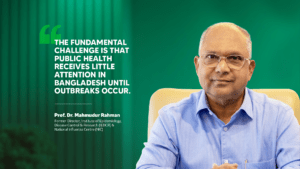1. Tell us about yourself (i.e. your family, childhood, education, what type of person you are, etc.)
Unlike most of the adults I would never agree to get back to student life as I had a tremendously dull school and college life apart from the amazing world of books. However, I could never stop studying due to my curiosity and drive to grow.
I am from a small town “Feni” with a strong bonding to Chattogram during childhood. My mother is a school teacher and my father used to own a bookstore in Feni. The love for reading has been flowing in the family tree now through my daughter.
I have discovered my passion for social business back in 2011 while being a key member of the Management Team of Grameen Danone. I love to learn about empowering leadership in appreciative culture, application of digital in business and shifts in customer preferences in the social media era.
2. You have previously worked at Novartis, Banglalink, and now at Grameen Danone. What made you shift from one to the other?
All these career moves were not precisely planned. I have always tried to expand my comfort zone and take on assignments which were not exactly aligned with my area of expertise. So, I have been exposed to intriguing learning experiences which in turn have strengthen my ability to anticipate, to adapt, to pursue high impact roles.
3. What did you love the most about each organization? Which one would you say had the biggest impact on your life?
The thing that amazed me the most would be how each organization seems to have a soul which is formed, designed, maintained through strong processes (sometimes even by the lack of it). Professionally, Novartis has had the biggest impact on my life and personally it’s Grameen Danone.
After a cross industry experience in procurement and supply chain (IDLC Finance, Square Pharma, Banglalink) I joined Grameen Danone from 2010-2012 as a supply chain & sourcing manager where I built and implemented processes and distribution networks. On top of these responsibilities, I successfully ran the manufacturing facility for several months.
I joined Novartis, first for a position in Bangladesh, and then was quickly nominated for a Leadership Career Path and sent to implement a six-sigma green belt certification from Switzerland and roll out operational excellence (OpEx) in Sandoz Japan from scratch.
Later, based in Austria, I have driven S&OP process optimization and a 10 years’ strategic plan for Novartis Anti-Infective Manufacturing platform. In the latest role in Japan, I have successfully led the supply chain of a delocalization project for a large manufacturing unit.
Novartis has invested tremendous organizational effort in moulding me as a strategic-thinking high impact leader. Grameen Danone guides me through the journey on how to utilize these learnings to enhance social impact.

4. Please let us know about Grameen Danone and its running projects? How does it ensure proper hygiene?
Grameen Danone Foods Limited (GDFL) is a social business based in Bangladesh with a significant social and economic impact, providing nutrition to 3 million kids and economic opportunities to 3000 people. Core product of GDFL is Shokti +, a yoghurt enriched in micro-nutrients (iron, zinc, vitamins) that gives kids strength.
GDFL is also a source of income for the inhabitants of surrounding villages: the small farmers sell their milk to the company and women with little resources earn an income by selling the yogurts door-to-door.
Apart from that, we have Ultimate by Shokti in super shops only which is a great product for health-conscious people.
Our products are made in a fully automated process and we have all required industry certifications including internal compliance according to the Danone international standard.
5. What is coming next from the Grameen Danone Team? Are we going to see a new product coming?
We have launched Shokti+ Mishti Doi (sweet yogurt) in our modern trade channel this May. Apart from that, we are extending our portfolio this year keeping focus on nutrition for kids and affordability for adults. From raw material sourcing to building the distribution network, we are focused on strengthening our existing ecosystem and maximizing opportunities for the community.
6. How do you feel about becoming a managing director at such a young age with such enormous responsibilities? What helped you reach this position?
I am the first ever Bangladeshi Managing Director of GDFL. I have never aspired to become managing director and interestingly I do not find this role much different from my previous roles as the key aspects remain similar to lead any team.
I strongly believe in building capability of people & processes through an enabling culture. I have immense experience in management & leadership in transformative environments, international exposure to large size businesses, diversities of cultures & ways of working, and a wide-ranging portfolio management. All of these together support my convictions for the present role.
7. How do you balance your professional life and personal life? What values are you committed to?
Sometimes our job is exhausting, both physically and psychologically. Unfortunately, there is no magical solution. Things will not go as planned, organizational priority will be changed. A hard-fought project may become obsolete halfway due to an unpredictable change in the business environment. So, it’s absolutely necessary to have the ability to self-motivate and to rejuvenate. Take a break, do what you like to do the most, connect with new people, visit a new place, go hiking, dine out with friends. At the end of the day we are the change agents for the organization so at first, we should focus on developing our ability to deal with and to optimize changes on a personal level.
The guiding principles of my life-
▪ Authentic leadership
▪ Create enabling and inclusive environment
▪ Collective success over individual performance

8. According to you, how was your Organization affected by the pandemic? How are they dealing with this situation?
During the COVID-19 outbreak, GDFL has quickly adapted to the situation and focused on employees’ health and safety as the key priority along with supporting the ecosystem around the organization. WeCare, a project initiated and fully funded by Grameen Danone employees, was formed to help the farmers and communities. We have immediately supported more than 100 families with food and hygiene products for one month.
GDFL has distributed liquid hand wash for every van and distributor point (~1000 people), and has donated 60,000 cups of yogurt to the most vulnerable people. We have also set up long term feed support program for dairy farmers.
We have quickly activated online ordering, home delivery systems and digital campaigns refocusing on the products linked with health, wellbeing and nutrition.
9. What are the biggest challenges you and your team are facing right now due to this pandemic?
The biggest challenge right now is to maintain and sustain a retail distribution network which has been affected severely by the pandemic. Also, ensuring the safety and well-being of our frontline heroes is our key priority. We have designed a robust healthcare system to support them and continuous reinforcement on safety measures. However, this will remain a key challenge in the months to come.
10. How did the pandemic affect you personally and professionally?
Coincidently we have embarked our cultural transformation journey amid the global crisis. The pandemic has given us the opportunity to reboot the organization in a robust way as we had to stop our operations completely before we started ramping up.
I have just completed my first 100 days as Managing Director and this has been an amazing experience full of challenges, uncertainty and humility. The vulnerability and the intensity of the situation has expedited our growth as a team and injected enormous resilience and passion to go the extra mile to deliver nutrition to the people in need.
11. What are the major changes you are expecting to see in your business after this global pandemic?
The major changes will be systematic digital disruptions rather than sporadic events. Consumer behavior is and will be shifting focus towards more localized consumption patterns and the need to eat healthy. The pandemic has shown us how vulnerable we are in the context of such uncertainties and this will drive us towards a new reality where restoring business as usual will not be good enough. We will look for sustainability and value creation as a whole for the community.

12. What would be your advice and suggestions to the young professionals right now? What skills of today’s youth do you like most?
Our upbringing teaches us to aim for materialistic goals such as setting an aim in life, what position we want to see ourselves in five years. etc. In this process we overlook the fact that life is dynamic and setting up a specific one-dimensional goal like this is limiting our possibilities. So, my advice will be to first focus inward, understand yourself and try to utilize your core strengths to shape up your expectations.
I am mesmerized by the tech-savvy and versatility of this generation. In terms of mindset, the ability to challenge the status quo, giving and receiving feedback, raising the profile in tough forums did not use to come so easily to our or prior generations.
13. Since many students are having free time during this pandemic, what can they do, besides regular studies, to prepare themselves for the competitive job market?
▪ Build a meaningful and diverse network.
▪ Keenly follow digital disruptions and build skills matching with self-aspirations.
▪ Find a role model and if possible, a mentor.
Last and the most important advice is to keep on reading new things and build a deep understanding of your inner self as this will be the core of your triumph in the coming days.






